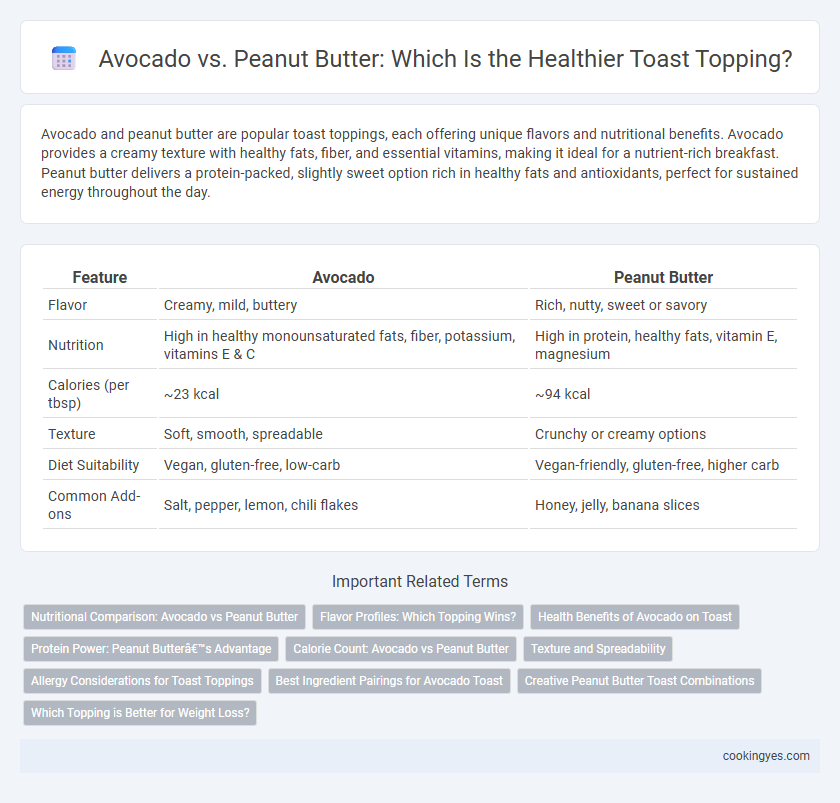Avocado and peanut butter are popular toast toppings, each offering unique flavors and nutritional benefits. Avocado provides a creamy texture with healthy fats, fiber, and essential vitamins, making it ideal for a nutrient-rich breakfast. Peanut butter delivers a protein-packed, slightly sweet option rich in healthy fats and antioxidants, perfect for sustained energy throughout the day.
Table of Comparison
| Feature | Avocado | Peanut Butter |
|---|---|---|
| Flavor | Creamy, mild, buttery | Rich, nutty, sweet or savory |
| Nutrition | High in healthy monounsaturated fats, fiber, potassium, vitamins E & C | High in protein, healthy fats, vitamin E, magnesium |
| Calories (per tbsp) | ~23 kcal | ~94 kcal |
| Texture | Soft, smooth, spreadable | Crunchy or creamy options |
| Diet Suitability | Vegan, gluten-free, low-carb | Vegan-friendly, gluten-free, higher carb |
| Common Add-ons | Salt, pepper, lemon, chili flakes | Honey, jelly, banana slices |
Nutritional Comparison: Avocado vs Peanut Butter
Avocado toast provides healthy monounsaturated fats, fiber, potassium, and vitamins E and C, supporting heart health and digestion. Peanut butter offers higher protein content, essential fatty acids, and vitamin B6, promoting muscle repair and brain function. Both toppings deliver unique nutritional benefits, with avocado favoring heart health and peanut butter excelling in protein and energy.
Flavor Profiles: Which Topping Wins?
Avocado offers a creamy, mild flavor with subtle buttery notes that enhance the natural taste of toast without overpowering it, making it a favorite for those seeking a fresh, smooth topping. Peanut butter delivers a rich, nutty, and slightly sweet profile with a thicker texture that adds robust depth and satisfying crunch, especially in crunchy or chunky varieties. Flavor preference depends on whether one prefers a subtle, healthy complement with avocado or a bold, protein-packed punch from peanut butter.
Health Benefits of Avocado on Toast
Avocado on toast provides a rich source of heart-healthy monounsaturated fats, which help lower bad cholesterol levels and reduce the risk of cardiovascular disease. It is also packed with essential nutrients like fiber, potassium, and vitamins E and C, promoting digestive health and enhancing skin vitality. Unlike peanut butter, avocado contains fewer added sugars and allergens, making it a cleaner, nutrient-dense choice for a balanced breakfast.
Protein Power: Peanut Butter’s Advantage
Peanut butter provides approximately 7-8 grams of protein per two-tablespoon serving, making it a superior choice for those seeking a protein boost on their toast compared to avocado, which contains only about 1-2 grams of protein per half fruit. This higher protein content supports muscle repair and sustained energy, ideal for breakfast or post-workout snacks. Peanut butter's protein-rich profile makes it a preferred topping for enhancing the nutritional value of toast.
Calorie Count: Avocado vs Peanut Butter
Avocado contains about 160 calories per half fruit, making it a lower-calorie option for toast compared to peanut butter, which has approximately 190 calories per two tablespoons. The healthy fats in avocado are mostly monounsaturated, while peanut butter offers a higher protein content alongside fats. Choosing avocado for toast toppings supports calorie-conscious diets with nutrient-dense benefits.
Texture and Spreadability
Avocado offers a creamy, smooth texture that spreads effortlessly on toast, creating a rich and buttery mouthfeel. Peanut butter, while also spreadable, varies between creamy and chunky types, providing either a dense, thick coating or a crunchy, textured bite. The airy softness of avocado contrasts with the more substantial, sticky consistency of peanut butter, influencing both ease of application and eating experience.
Allergy Considerations for Toast Toppings
Avocado offers a hypoallergenic alternative for toast toppings, making it suitable for individuals with peanut or tree nut allergies. Peanut butter, a common allergen, can trigger severe allergic reactions, including anaphylaxis, restricting its use among sensitive populations. Choosing avocado reduces the risk of allergenic responses while providing healthy fats and nutrients essential for a balanced diet.
Best Ingredient Pairings for Avocado Toast
Avocado pairs exceptionally well with ingredients like cherry tomatoes, feta cheese, and fresh herbs such as cilantro or basil for a flavorful and nutritious toast topping. Adding a sprinkle of chili flakes or a drizzle of balsamic glaze can enhance the creamy texture and natural richness of avocado. Combining these ingredients creates a balanced and visually appealing avocado toast, perfect for a healthy breakfast or snack.
Creative Peanut Butter Toast Combinations
Peanut butter offers versatile, protein-packed toast topping options that pair well with fruits like bananas, strawberries, and apple slices, enhancing both flavor and nutrition. Creative peanut butter toast combinations include drizzling honey, sprinkling chia seeds or cinnamon, and adding dark chocolate chips for a rich, satisfying taste. These combinations provide a balanced mix of healthy fats, fiber, and antioxidants, making peanut butter an ideal choice for flavorful and nourishing toast.
Which Topping is Better for Weight Loss?
Avocado on toast provides healthy monounsaturated fats and fiber that promote satiety and support weight loss by stabilizing blood sugar levels. Peanut butter, rich in protein and healthy fats, also aids in appetite control but tends to be higher in calories per serving, potentially hindering calorie deficit goals. For weight loss, avocado is generally the better toast topping due to its lower calorie density and nutrient profile that encourages fullness without excess calories.
Avocado vs Peanut butter for Toast Toppings Infographic

 cookingyes.com
cookingyes.com